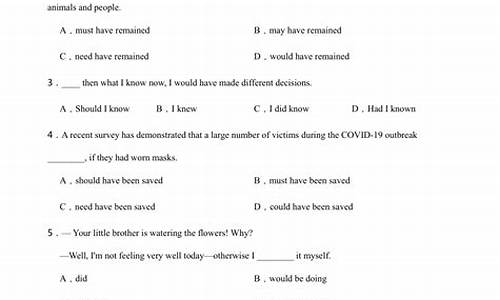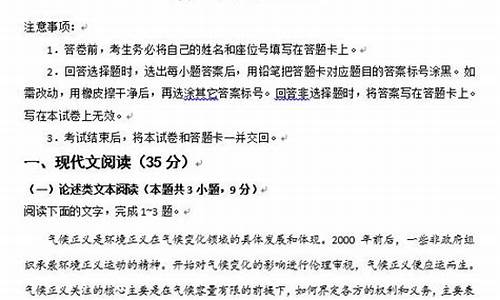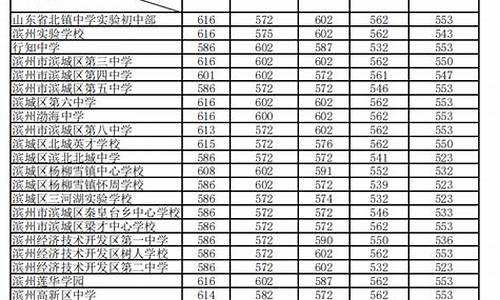您现在的位置是: 首页 > 录取信息 录取信息
高考英语虚拟语气-高考英语虚拟语气真题
tamoadmin 2024-08-09 人已围观
简介1.谁还记得英语中虚拟语气的规律啊2.高一英语虚拟语气,是怎么回事?3.虚拟语气2020年以后高考考吗4.高考英语语法:高中英语语法-浅谈虚拟语气的特殊用法5.wouldrather的解释是什么谁还记得英语中虚拟语气的规律啊英语动词中一般有三种语气:用来陈述事实的陈述语气;用来表示命令、请求或劝告的祈使语气;还有用来表示与事实相反的设、愿望、建议的虚拟语气。历年来,体现英语交际功能并能考查学生对对
1.谁还记得英语中虚拟语气的规律啊
2.高一英语虚拟语气,是怎么回事?
3.虚拟语气2020年以后高考考吗
4.高考英语语法:高中英语语法-浅谈虚拟语气的特殊用法
5.wouldrather的解释是什么
谁还记得英语中虚拟语气的规律啊

英语动词中一般有三种语气:用来陈述事实的陈述语气;用来表示命令、请求或劝告的祈使语气;还有用来表示与事实相反的设、愿望、建议的虚拟语气。历年来,体现英语交际功能并能考查学生对对话语境,说话者语气理解能力的虚拟语气相关试题在高考中不断出现。请看下面一些例题: 1. I didn't see your sister at the meeting. If she had come, she would he met my brother.(NMET'94) 2. When a pencil is partly in a glass of water, it looks as if it were broken. (NMET'95) 3. You didn't let me drive. If we had driven in turn, you wouldn't he got so tired. (NMET'96) 4. Should it rain tomorrow, we should he to put off the visit to the Yangpu Bridge. (上海94 ) 由此可见,掌握好虚拟语气很重要。在学习中,学生一向把它列为难度大、形式多样、不易掌握的语法项目之一。同时,虚拟语气考题也是学生易失分的一个方面。其实,虚拟语气主要是考查学生对虚拟语气谓语动词形式的掌握。而虚拟语气动词形式多样,有should+动词原形;有动词用过去式,过去完成时;有would (could,should,might )+动词原形等等。困难就在学生不能清楚记忆什么情况下用哪种动词形式。于是,针对此问题,笔者就虚拟语气动词形式进行研究、分析,摸索出一定的规律,把虚拟语气根据动词形式归类成如下三种。 一、非真实条件句中的虚拟语气形式(即三个公式)。 1.与现在事实相反的。 条件从句主句 动词用过去式(be的过去式一般用were) 主句 would(could,should,might)+动词原形(should只用于主语为第一人称) 例:If I had time now, I would go to the cinema with you. The boy is not hungry. If he were hungry, he would eat the cake. 2.与过去事实相反的。 条件从句 had+过去分词 主句 would(could,should,might)+he+过去分词(should只用于主语为第一人称) 例:If he had been warned, he would not he taken that food. Luckily he was sent to the hospital immediately. We didn't know her address. If we had known it, we would he sent a note to her. 3.与将来事实可能相反的。 条件从句主句 动词三种形式可用:动词过去式should+动词原形were to+动词原形would(could,should,might)+动词原形 例:If it should rain (rained或were to rain) tomorrow, we would he to put off the visit to the Great Wall. [注意]1.虽然有些句中没有明显的if条件从句,而是通过一些介词短语如but for, without或分词短语或副词otherwise等来表示一个含蓄的条件,相当与一个if条件句,这种情况下要注意主句动词虚拟语气形式。例: But for the efforts of the captain , the ship would he sunk. (If it had not been for the efforts of the captain,...) Given more attention, the trees would he grown better. (If the trees had been given more attention,...) I was very busy then. Otherwise I would he helped you with your work. (I was very busy then. If I had not been busy then,...) 2.在虚拟语气中,如果if条件从句有were或助动词should/had,可以把if省略,把were /should /had移至句首,用倒装句。例: If it had not been for the efforts of the captain, the ship would he sunk with all the passengers.可省略if ,把had移至句首,改为: Had it not been for the efforts of the captain, the ship would he sunk with all the passengers. 二、(should )+动词原形的虚拟语气形式。 下列几种情况用(should) +动词原形的虚拟语气形式。 1.在It is natural(important, necessary等)that...句型。例: It is natural that you (should) say apology to him. It is necessary that he (should) be sent to hospital at once. 2.用于表示命令、建议、要求一类动词后的宾语从句,如suggest,order,insist,demand,request,command等。例: The young man insisted that he(should) be sent to do the work. I suggested that we (should) set off earlier. [注意]当insist表示对已发生过的事物的看法,或当suggest为"说明了","暗示"的含义时,从句用陈述语气而不用虚拟语气。 The Arab insisted that he hadn't seen the camel. His smile suggested that he was hy. 当表示命令、建议、要求等名词作主语时,其表语从句也用(should)+动词原形的虚拟语气形式。这类名词有suggestion,request,order,advice,idea等。例: The officer's order was that his soldiers should repair the defence works at once. His advice is that your father should do more exercises in the morning. 上述名词的同位语从句中也应用(should)+动词原形。例: I did not receive the order that you(should) lee here at once. His suggestion that you (should) keep silent is reasonable. 三、谓语动词用过去时(即过去式,过去完成时)的虚拟语气形式。 在wish, would rather, as if, if only等后面的从句,如表示与现在事实相反,其谓语动词用过去式;如表示与过去事实相反,其谓语动词用过去完成时。其中wish后的宾语从句如表示与将来事实相反,谓语动词则用would或could +动词原形;would rather后的宾语从句如表示与将来事实相反,动词仍用过去式;as if引导的从句如表示与事实相符则不用虚拟语气形式。在虚拟语气中be的过去式一般用were。例: -Did you go to the party yesterday? -Yes, but I wish I hadn't. (gone to the party yesterday) I would rather you went next Sunday. I would rather you hadn't done that. If only you had followed my advice. She loves the child as if he were her own. 经过以上归类,学生就能巧记变化多样的虚拟语气形式,从而更好地掌握运用虚拟语气。
高一英语虚拟语气,是怎么回事?
虚拟语气是以动词的特殊形式来说明句中所叙述的内容不是事实,或是不可能发生的事情,而是一种愿望、建议或是与事实相反的一种设。虚拟语气通常出现在各种主从复合句中。
一、在宾语从句中
1.当主句的谓语动词为“suggest,propose,advise,insist,order,demand,require,request, desire’’等表示“建议”、“命令”、“请求”和“要求”的动词时,其后的宾语从句中要用虚拟语气“should+动词原形”(在美国英语中 should省略)。例如:
I suggest that we(should)hold a meeting tonight.我建议我们今晚开个会。
We advise that steps(should)be taken at once.我们建议要立刻取措施。
They insisted that he(should)begin the work at once.他们坚持让他立刻开始工作。
He ordered that aU(should)take part in the work.他下令所有的人都要参加这项工作。
另外,当主句动词为“ask,move,urse”等意为 “要求”、 “提议”和“极力主张”时,其宾语从句也常用虚拟语气。例如:
He asked that he be given an opportunity to try.他要求给他一个尝试的机会。
I move that the money be used for books. 我提议把这笔钱用于买书。
They urged that we take action on this matter immediately.他们极力主张我们对这件事立即取行动。
2.当主句动词为wish,表示“但愿……”,“要是……该多好叼”之意时,其后的宾语从句有以下三种虚拟语气形式。
①动词用过去式来说明与现在的事实相反(BE动词常用were,但有时也可用was)。例如:
I wish 1 were/Was as strong as you.我要是像你一样强壮就好了。
I wish l remembered his address.我要是记住他的地址就好了。
有时;为了强调现在状态下能发生某种情况或进行某项动作,从句中的动词也可用过去进行式。例如:
I wish it wasn’t raining.要是天不下雨就好
了。
②动词用过去完成式说明与过去的事实相反。例如:
We wish we had paid more attention to our pronunciation.我们以前要是能更注意我们的发音就好了。
He wished he had stayed at home。他但愿他呆在了家里。
③情态动词“would,could,might”等后接动词原形,表示对将来的希望(通常不用should)。例如:
I wish he would try again.我希望他再试一下。
We wish he could come.我们希望他能来。
3.在prefer之后的宾语从句中用“should+动词原形”(should可省略)。例如:
We prefer that the plan(should)be fully discussed before being put into execution.我们希望在实施之前进行认真的讨论。
4.在would rather之后的宾语从句中,其动词用虚拟语气,表示句子的主语(某人)宁愿让另一人做某事。
①用动词过去式表示现在或将来要做的事。例如:
I’d rather you went home now.我宁愿让你现在就回家。
Don’t come tomorrow.I’d rather you came nextweekend.明天别来,我宁愿你下个周末来。
一Shall l open a window?我开窗行吗? 一I’d rather you didn’t.你最好别开。
②用动词的过去完成式表示过去的动作。
例如:
I’d rather you hadn’t done that.我真希望(宁愿)你没做过那件事。
二、在主语从句中
1.在句型“h is/was+过去分词+that从句”中,当过去分词为“suggested,ordered,desired,insisted, required,demanded,requested,decided,proposed,urged’’等时,从句中要用“should+动词原形”(should可省略)。例如:
h is desired that everyone(should)get erything ready bY toniShL要求每一个人在今晚之前要将一切准备好。
It is requested that Miss Zhang(should) give a performance at the party.请求张**在晚会上表演一个节目。
2.在句型“h is/Was+形容词+that从句”中,当形容词为“important,necessary,strange,natural’’等时,从句中要用“should+动词原形”(should可省略)。例如:
It is important and necessary that we should master a foreign language.掌握一门外语对我们来说是重要的和必要的。
It is strange that he (should) refuse your help.他竟然拒绝你们的帮助,真奇怪。
3.在句型“h is/was+名词+that从句” 中,当名词为“a pity,a shame,no wonder’等时,从句中要用“should+动词原形”(should可省略)。例如:
It is a great pity that he should be so selfish。真遗憾,他竟然那么自私。
三、在同位语从句或表语从句中
在名词“suggestion,proposal,idea,plan,order,advice’’等后面的同位语从句或表语从句中,用“should+动词原形”(should可省略)。例如:
I made a proposal that we(should)hold a meeting next week.我提出了我们下个星期开会的建议。(同位语从句)
His suggestion that the meeting(shoald)be held in this room has been accepted.他的关于在这个房间召开会议的建议被纳了。(同位语从句)
My idea is that we(should)get more people to attend the conference.我的想法是我们多找些人来参加会议。(表语从句)
四、在定语从句中
在句型“h is(high)time+(that)从句”中,谓语须用虚拟语气。用过去式表示现在或将来的意念,意为“现在是该做某事的时候了”。
例如:
It iS(high)time(that)we went home.我们该回家了。
五、在状语从句中
1.在设条件句的if条件从句中
设条件句一般是由“if引导的条件从句+主句”构成。if从句中的谓语动词要用虚拟语气的形式。if从句的设可以是与现在事实相反的条件、与过去事实相反的条件或者与将来不太可能成为事实的条件。下面分述表示这三种条件的if从句的结构:
①与现在的事实相反,其句子结构为“If+主语+were/谓语动词的过去式”。例如:
If I were you,I shouldn’t do that.如果我是你,就不会做那件事了。
We would go with you if we had time.如果我们有时间的话,就和你一道去了。
We could ask him if he were here.如果他在这儿,我们就可以问他了。
②与过去的事实相反,其句子结构为“If十主语+谓语动词的过去完成式”。例如:
If he had seen you yesterday,he would he asked you about it如果昨天他见到你,他就会问你那件事了。
If you had come earlier,you would he met him.如果你早点儿来,就会遇到他了。
1 would he called you if I had known your telephone number.如果我知道你的电话号码,就打电话给你了。
③表示将来不太可能实现的条件,其句子结构为“If+主语+动词过去式/were to+动词原形/should+动词原形”。例如:
If he came tomorrow,he would find me in the schoo1.如果他明天来的话,会在学校找到我。
If it should rain,the crops would be sed.如果下雨,庄稼就有救了。
If it were to snow tomorrow,they would not go out.如果明天下雪,他们就不出去了。
注:在if从句中,如果含有“were,should,had’’时,可省去if而将“were,should,had’’置于句首,构成倒装句。例如:
Were l in your position,1 would go.如果我处在你的位子上,我就走了。
Had you arrived five minutes earlier,you could he seen them off.如果你早到五分钟,
你就可以给他们送行了。
Should he come,tell him to ring me up.如果他来的话,叫他打电话给我。
2.在目的状语从句中
①在由lest
和in case等引导的目的状语从句中,用“should+动词原形” (should可省略)。例如:
He ran away lest he(should)be seen.他跑走了,以免被人看到。
She explained again and again in case he (should)misunderstand her.她解释了一遍又一遍,以免他误解她。
in case等引导的目的状语从句中的谓语有时也可用陈述语气。此时,从句表示的就是真实情况,而不是虚拟情况。例如:
Take warm clothes in case the weather is cold.带上厚衣服,以防天气变冷。
②在由“so that…”和“in order that…”
引导的目的从句中,要用“can/could/may/might/would+动词原形”,以表示目的并非事实。例如:
She stayed at home for a few days so that
she might/could take care of her sick mother. 她在家呆了几天,以便照顾她生病的母亲。
③在由“for fear that…”引导的从句中,用“should+动词原形”(有时也可用may/might/would)。例如:
He worked hard for fear that he should fail.他努力学习,害怕考试不及格。
3.在方式状语从句中
由as if和as though等引导的方式状语从句中,如果从句所表达的情况是虚拟的,则①常用动词的过去式来表示与现在或当时的情况相
反;如果是BE动词,则用were;②常用过去完成式来表示与过去的情况相反。例如:
She loves the child as if he were her own.她爱这孩子就好像是她亲生的。
(实际上不是她亲生的孩子)
Holding his head high,he walked past the pole and the soldiers as if they didn’t exist.他昂着头从旗杆和卫兵身旁走过,就像他们不存在似的。(实际上他们是存在的)
He speaks English as well as ifhe hadstudied in England.他英语说得这么好,好像他去英国学过英语似的。(实际上他没有在英国学过英语)
4.在原因状语从句中
在“I’m sorry that.—/We were surprised that一./They were disointed that...”等引导的表示原因的状语从句中,用“should十动词原形”。例如:
I’m sorry that he should be in such poor health.他的身体这么差让我很难过。
We were surprised that she should be so stubbom.她这么固执让我们感到奇怪。
上述句子有时也可以用陈述语气,但这仅表示所叙述的是事实,而不表示讲话人的情绪。
虚拟语气2020年以后高考考吗
英语中的语气分为陈述语气、祈使语气、虚拟语气、疑问语气和感叹语气五个类别。
虚拟语气是说话者用来表示设,或难以实现的情况好,而非客观存在的事实,所陈述的是一个条件,不一定是事实,甚至完全与事实相反。
此外如需表达主观愿望或某种强烈的感情时,也可用虚拟语气。
虚拟语气通过谓语动词的特殊形式来表示。
虚拟语气表示说话人的主观愿望、猜疑、建议或与事实不符的设等,而不表示客观存在的事实。
虚拟语气是由句中的谓语动词的特殊形式表示出来的。如:
If I were a bird,I would be able to fly in the air.
如果我是一只小鸟,我就能在空中飞行。
I wish I could pass the examination.
我希望我能通过考试。
希望能帮助到你,谢谢。
高考英语语法:高中英语语法-浅谈虚拟语气的特殊用法
《高中英语语法-浅谈虚拟语气的特殊用法》由英语我整理,更多请访问:s://.liuxue86/english/。本内容整理时间为05月12日,如有任何问题请联系我们。
浅谈虚拟语气的特殊用法
1. 当虚拟条件从句中的谓语动词和主句中的谓语动词发生的时间不一致时,主句和从句的谓语动词应根据实际的时间选用适当的动词形式。如:
If you had earned enough money,you would live a hy life in the future.
如果你已挣了足够的钱,你今后就会过上幸福的生活。
(从句与过去事实相反,谓语动词用过去完成时;主句与将来事实相反,谓语动词用? would/should/could/might+ 动词原形?。)
2. 在虚拟语气中,有时设的情况并不是以条件状语从句的形式表示,而是通过相应的介词或连词来表示,如 without, but for, or, but, otherwise 等。如:
But for your help,we couldn?t he finished the task in time. (= If you hadn?t helped us? tomorrow?)
要不是你的帮助,我们就不会按时完成任务。
3. 在 if 引导的虚拟条件句中,如果条件状语从句位于句首,且从句中含有 were, had 或 should ,则可以省略 if ,并用倒装结构。如:
Should it rain tomorrow,we would he to stay at home. (= If it should rain tomorrow?)
如果明天下雨,我们就得呆在家里。
4. 如果主句中含有 would rather, would as soon, would sooner 或 would prefer ,则从句要用过去时表示当时或将来的情况,用过去完成时表示过去的情况,表达希望或婉转的责备。如:
I would prefer he worked hard.
我倒希望他能够努力学习。
I would just as soon you had returned the book yesterday.
我真希望你昨天把这本书还了。
5. 在? It?s (high/ about) time + that 从句?中, that 从句的谓语动词要用虚拟语气,表示?是该?的时候了?,其形式为一般过去时或? should + 动词原形?,但 should 不能省略。如:
It?s time that we began our meeting.
是该开会的时候了。
It is high time that we should tell him the truth.
是我们该告诉他真相的时候了。
6. 在表示建议、命令、要求、坚持( suggest , order , demand , propose , request , command , insist )等相关的名词性从句中,谓语动词要用虚拟语气? (should) + 动词原形?。如:
The order that we should reach the small village before daybreak came just now.
要求我们在天亮之前赶到小村庄的命令刚刚下达。(同位语从句)
The suggestion is that we (should) recite a passage each day.
建议是我们每天应背诵一篇短文。(表语从句)
It is demanded that we (should) get everything ready by tonight.
我们被要求今晚之前把一切都准备好。(主语从句)
7. 在? It is + 形容词 + that 从句?中,从句的谓语动词要用虚拟语气? (should) + 动词原形?。这类形容词有 necessary, important, essential, strange, natural 等。如:
It is necessary that he (should)be sent to the hospital at once.
立刻送他进医院是非常必要的。
8. 由 wish 引起的表示愿望的宾语从句,其谓语要用虚拟语气。当 wish 表示的是与现在或当时事实相反的愿望时,它所引起宾语从句的谓语动词要用一般过去时或过去进行时;当 wish 表示的是与过去事实相反的愿望时,它所引起宾语从句的谓语动词要用过去完成时;当 wish 表示的是将来难以实现的愿望时,它所引起宾语从句的谓语动词要用? would/ should/ could/ might + 动词原形?。如:
I wish I had enough money to buy a car.
我希望能有足够的钱来买一辆小汽车。(表示的是现在)
He whishes he had not lost the chance.
他真希望没有失去机会。(表示的是过去)
I wish I would join the army when I grow up.
我希望长大后能够参军。(表示的是将来)
9. 在 insist 和 suggest 后的宾语从句中常用虚拟语气表示建议、要求或命令。但当 insist 表示?坚称;主张?时,宾语从句要用陈述语气;当 suggest 表示?表明;暗示?时,宾语从句也要用陈述语气。如:
She insisted that she had seen a thief climb into the house through the window.
她坚持说她曾看见一个小偷从窗口爬进了房间。
The smile on his face suggested that he had passed the exam.
他脸上的微笑表明他已通过了考试。
10. 在 as if / as though 引导的状语从句表示的是非真实情况时,从句的谓语动词要用过去时或过去完成时。如:
She talked about the film as if she had really seen it.
她谈论那部影片,就好像她确实看过一样。
安徽?梁静渊 《高中英语语法-浅谈虚拟语气的特殊用法》由英语我整理,更多请访问:s://.liuxue86/english/
wouldrather的解释是什么
wouldrather的意思是:宁愿,宁可。
wouldrather的意思是:宁愿,宁可。wouldrather的例句是Iprefertobecalledafoolratherthanfight.我宁可被叫作傻瓜也不要打架。wouldrather的读音是英[w_d'rɑ___];美[w_d'r___r]。
一、网络解释点此查看wouldrather的详细内容
1.
1.宁愿:英语虚拟语气讲解,其中包含各种情况下虚拟语气的运用如表建议的(suggest,order),愿望的(wish)宁愿(wouldrather)等.课件中也涉及大量的高考题目.
2.
2.宁愿,宁可:thriveon靠...健壮成长;因...蓬勃发展|wouldrather宁愿,宁可|wouldrather...than宁愿...而不愿
3.宁可,宁愿:24.workwith对...行得通,对...起作用|25.wouldrather宁可,宁愿|26.wouldrather...than宁愿...而不
二、例句
Iprefertobecalledafoolratherthanfight.
我宁可被叫作傻瓜也不要打架。
Heresignedratherthanstiflehisconscience.
他宁可辞职也不违背自己的良知。
Hepreferredtoflyratherthantrelbytrain.
他宁愿做飞机而不愿做火车。
Iwouldbetterdiebeforeaskinghimforhelp.
我宁愿死也不愿向他求救。
三、词汇搭配
wouldratherhesomeone'sroomthansomeone'scompany希望某人走开,不愿见...wouldrather的相关临近词
would、Wouldgivetheworldto.
点此查看更多关于wouldrather的详细信息









